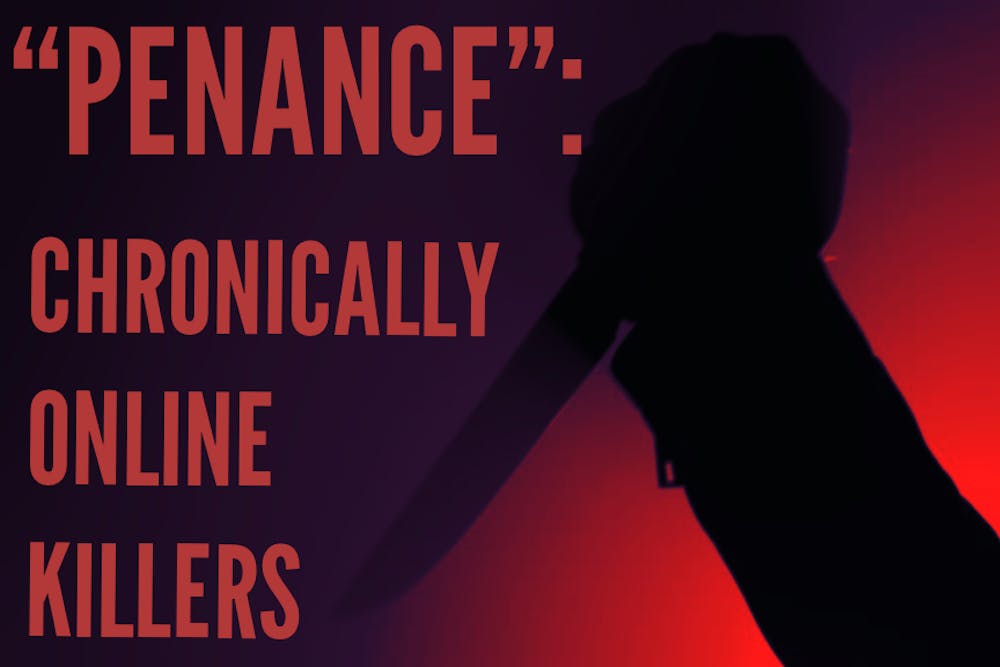People are obsessed with killers. In December, Gypsy-Rose Blanchard was released from prison and immediately became the main character of Twitter (now X), with users reposting her selfies and interview clips with comments of, “Yasss, queen, slaaaayy.” Killers fascinate us, and true crime writers, producers and podcasters love to capitalize on that fascination. Open up Netflix and you’ll see the newest Emmy-bait serial killer miniseries or some gruesome true crime documentary splashed across the homepage. But what are the ethics of sensationalizing grisly crimes for mass consumption? After all, real people suffered, and it’s being turned into entertainment for profit. Eliza Clark’s 2023 novel “Penance” scathingly critiques the true crime genre, while examining the twisted minds of chronically online teenage girls and interrogating who exactly would want to document and profit from a terrible crime.
True crime “journalist” Alec Z. Carelli investigates the gruesome murder of a 16-year-old girl in a tiny North Yorkshire town, Crow-on-Sea. In 2016, she was tortured and set on fire by three of her female classmates, dying later from injuries. The killers were later found and arrested — it’s not a mystery of who committed the murder but of why. Carelli positions himself as a serious investigator, listing off his accolades and distancing himself from exploitative true crime podcasts, such as the tastefully titled “I Peed on Your Grave.” He moved to Crow-on-Sea in order to conduct interviews and do research; he corresponds with the killers in jail; he reads the entirety of the killers’ Tumblr blogs to get a holistic view of their psyche. He’s a professional. However, from the very beginning you know there’s something off about his account. As the novel reveals more about the killers, you also get more and more insight into what kind of a person Alec Z. Carelli is. Everything brought to light about both the crime and Carelli himself brings into question whether or not what he’s doing is ethical and whether or not anything he’s written is true.
“Penance” is incredibly layered: It’s written as if it were a non-fiction true crime account, even though the events depicted are entirely fictitious. However, this so-called “true” crime may or may not be mostly fiction made up by Carelli. The characters and the world are so well-defined that it feels like you’re truly reading a work of non-fiction. Clark crafts a detailed, bloody history for Crow-on-Sea involving Vikings and haunted hotels that is so specific that I originally assumed the town was real. Crow-on-Sea is a tiny tourist town with no tourists. Rampant socioeconomic issues plague the town which significantly inform how the characters interact with each other and the world around them. The character work in this novel is simply phenomenal. I’ve never read a work of fiction that so accurately portrays the inherent discomfort of being a teenage girl and how damaging internet culture can be. The killers, at the end of it all, are devastatingly insecure and hurt teen girls, and this insecurity manifests in cruelty, which turns into violence. Tumblr plays a significant role in the killers’ lives, and it’s portrayed so accurately that either Clark has godly research abilities, or she was in the trenches of 2010s Tumblr herself.
“Penance” is an expertly crafted novel that draws you in and doesn’t let you go. I stayed up until 4 a.m. reading, needing to know more about what would make the girls commit a crime so heinous. Although this book critiques true crime, it also perfectly captures the appeal of the genre. Even with all the all the ethical concerns, it’s undeniable: Killers fascinate us.










